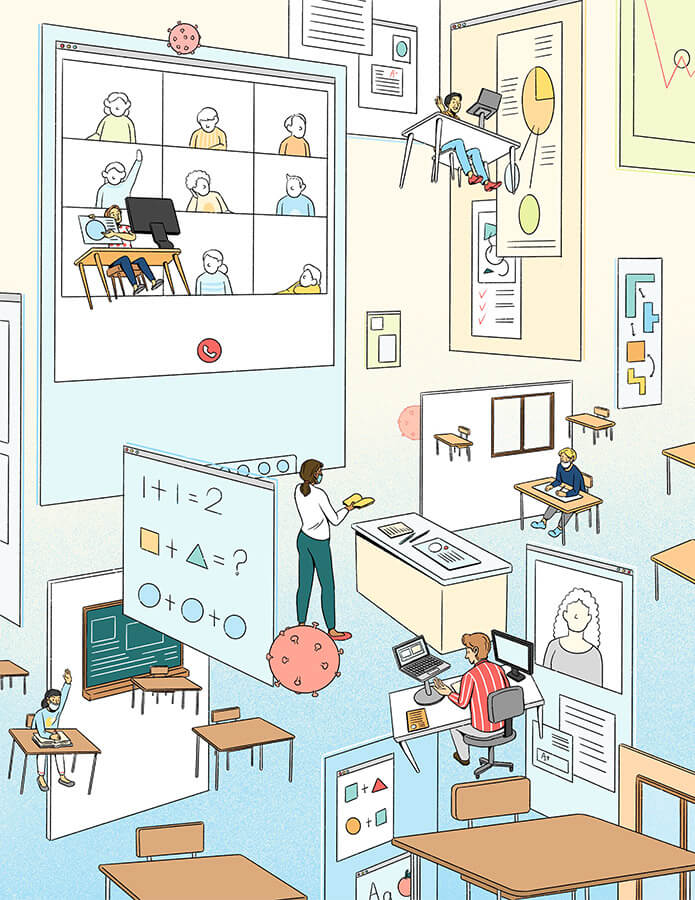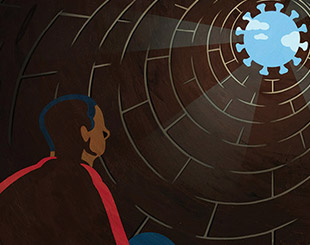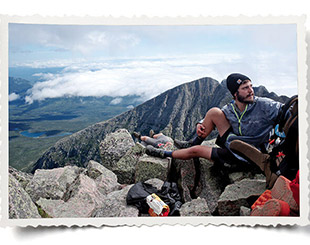For all their careful and meticulous planning, any teacher will tell you that each day in the classroom is going to look different. Teachers must prepare for the unexpected, then roll with the changes when even contingency plans don’t play out like they thought they would.
During a pandemic in the teaching world, though, “different” is putting it mildly. But Mavericks—by definition, original, unconventional trendsetters—are uniquely positioned to succeed in classrooms that probably don’t look much like what they trained for. The spring 2020 graduates who earned their teaching certification through UTA’s College of Education stepped into their own classrooms across the Dallas-Fort Worth Metroplex, rising to the challenge of being first-year teachers during the COVID-19 pandemic.
“If you can handle this, you can handle anything,” says Holly Hungerford-Kresser, associate professor of literacy studies and English education. “The brilliant part of this trial by fire with pandemic schooling is that it’s hard to imagine anything being more difficult. Teachers, students, families, and districts have never been through anything like this before.”
The New Normal
On a typical day, Georgina Adame (’20 BA, English) wakes up at 4:45 a.m. to walk her dog before she gets ready to teach seventh grade at Ferris Junior High in Ferris, Texas, giving her plenty of time to get ready for a day in the classroom. But on the day of Adame’s interview for this article, the Ferris Independent School District was experiencing Wi-Fi outages at all schools. Without wifi, she says, everything used for the teaching process is affected.
The Ferris ISD teachers received this information at 6:30 a.m. School starts at 7:45 a.m.
“Crazy is the only word to describe it,” she says. “I never thought I’d have to constantly remind my class to charge their Chromebooks or that I’d have to encourage students to buy a mouse for their laptop. We are preparing 21st-century learners for 21st-century careers.”
For new and veteran teachers alike, nothing is the same anymore. All are finding ways to adapt their teaching to face-to-face and virtual learning, usually for the same class period at the same time. Adame detailed subtle and vast differences she’s seen in the classroom that have affected her and her students.
“UTA did prepare me to teach, but there is no way they could have known this was going to happen,” she says. “Nothing compares to what I actually do on a daily basis. I never expected having to sanitize everything and distance my students’ desks. My kids don’t necessarily understand deeply why we still wear masks or why they can’t bring valentines to school to pass out.”
Above and Beyond
Teachers as professionals are often overlooked and underappreciated, while simultaneously being considered beloved by those personally impacted by great ones. It’s a vocation that requires its workers to go above and beyond the call of duty—and that aspect of teaching hasn’t changed, especially in times when social isolation and breaks from routine are creating mental and emotional strife for many.
Adame described a student she has worked with closely during her first year. The student’s anxiety was so severe that she would physically walk with him from his parents’ car in the mornings just to get him into the building for the day. He was often terrified to enter the school, standing with his head in his hands, crying and needing to be coaxed to leave the parking lot.
“Three weeks before the end of the first semester, he started walking into my classroom and sitting down on his own,” she says. “Now he comes to school early and is ready to go. He can leave my classroom now, walking out with friends, laughing their heads off. He doesn’t need me to walk him to other classes anymore. But that took about 12-13 weeks. Lots of teachers probably give that blanket statement, ‘I do it for the kids,’ but it’s because we really do, as teachers. We love our kids.”
As Dr. Hungerford-Kresser prepares new teachers, she keeps in mind how teaching in a pandemic is exceedingly different than the expectations some of these first-year teachers may have had.
“Teachers’ schedules, classrooms, and which students they are instructing can change daily,” she says. “They have to pivot with quarantines; they have to teach students simultaneously online and face-to-face. It is the ultimate test of teacher flexibility and compassion. Students, families, co-workers—everyone needs a lot of grace right now.”
Prepared for Anything
In the Red Oak Independent School District, second grade teacher Olivia Hubbard (’20 BA, Education) is one of three brand new first-year teachers at her school, H.A. Wooden Elementary.
“It’s actually the best time to be a first-year teacher because now every teacher is back to square one,” Hubbard says. “While my graduation in May 2020 feels so long ago, I think about my UTA professors every day. My time at UT Arlington instilled in me an awesome skill set as a teacher. UTA is where I learned the strategies and techniques I’m implementing and using in my classroom daily.”
Teachers managed to advance the education field by a decade in only a few short weeks when the pandemic first shut down schools. While there is much to learn as the field of virtual learning progresses, Kathleen Tice, clinical assistant professor of literacy studies in UTA’s Department of Curriculum and Instruction, says graduates from UT Arlington have long benefited from online programming to prepare teachers, so teaching online was not entirely new for instructors.
“I was determined to show the UTA graduates in the spring of 2020 that the pandemic would not prevent me from helping my students learn what they need to know to be effective teachers,” says Dr. Tice. “I demonstrated alternative ways to reach the same learning objectives through a virtual environment and showcased the importance of capitalizing on virtual resources. I knew many children would be counting on them once they left UTA.”
If you can handle this, you can handle anything. The brilliant part of this trial by fire with pandemic schooling is that it’s hard to imagine anything being more difficult.
When not in a pandemic, UTA students attend field experiences face-to-face in classrooms with Texas Education Agency-certified teachers. Clinical teaching starts in the final semester of a student’s senior year at UTA and ends with graduation. Currently, if they are not face-to-face, as in the pandemic for some, they teach online in cooperation with their assigned certified teacher.
“As a student teacher, I learned a lot just seeing how other teachers in action set expectations for their students and implemented classroom management,” says Hubbard. “Now that I’m in my own classroom, I’ve also realized that teaching is a work of heart, which sounds cheesy. It’s true, however, because teaching has taken every ounce of who I am as a human being, and I freely give all of that to my kids.”
Joseph Hooks (’20 BS, Interdisciplinary Studies), who currently teaches fifth grade math and science at Mary Orr Intermediate in the Mansfield Independent School District, says the pandemic forced a quick turnaround for teachers to go from being in the physical classroom to being online.
“I had completed most of my field experience hours before spring break of 2020,” says Hooks. “Those of us who needed it were given alternate assignments to finish up observation hours. I felt fortunate that throughout my time at UT Arlington, preparing to be in my own classroom was covered extensively. I don’t feel like I missed anything due to any interruptions from COVID in my last semester.”
Student teaching and clinical training are essential parts of a robust learning experience for those going into education. The field experiences greatly enhance the classroom lessons at UT Arlington of pedagogy and content knowledge.
“My expectations going into teaching were that it would be different every day and that teaching would be a job that I would enjoy,” says Hooks. “I’ve experienced both so far during this pandemic.”
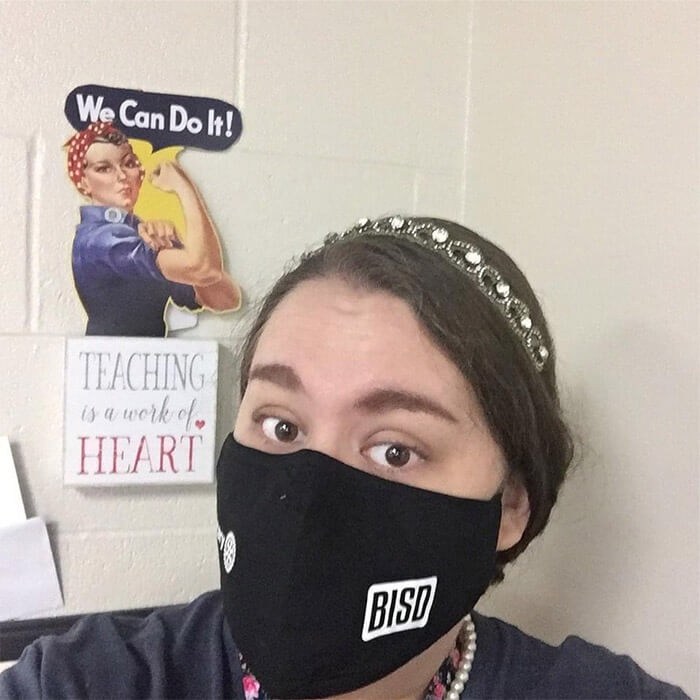
Emily Rogers
UTA students began their spring 2020 semester anticipating a requirement of completing 14 to 16 weeks of clinical teaching in local schools.
When the pandemic hit, the Texas Education Agency allowed students who had completed 10 weeks of clinical teaching to finish at that point. Students who began their clinical teaching at the beginning of the spring 2020 semester were able to stop at that time, having completed exactly 10 weeks. Others worked with their cooperating teachers and assisted in setting up online teaching to complete their required 10 weeks.
“My professors at UTA worked so hard that last spring semester to make us soon-to-be graduates feel supported, prepared to graduate, and ready to go out into the world to teach,” says Myka Miller (’20 BS, Interdisciplinary Studies), who is currently teaching seventh grade math at Shackelford Junior High in the Arlington Independent School District.
“My mom was a teacher, and I remember growing up playing classroom with my friends,” she says. “Then in high school, when math was the bane of my existence, I had a great set of teachers who showed me how to love learning in a subject that I absolutely hated. That’s when I knew I wanted to be a teacher.”
At times, Miller admitted, she struggles with the emotional and mental toll teaching can take.
“I can still hear my professor’s voice in my head, telling my class at UTA to crumple up a piece of paper. Saying that’s how these students come to you, with problems, worries, fears, all crumpled up,” Miller recalls. “As a teacher, you can only soften the edges, smooth out each paper as best you can, and not try to carry it all with you. Because you can’t carry hundreds of pieces of crumpled-up papers and still take care of yourself. These kids are going through some heavy stuff, and the pandemic especially has brought out some horrible situations for them. All I can do is smooth out the hurt where I’m able to and do my best to help my kids feel supported.”
As these first-year teachers and their students are still processing the pandemic, Melissa Hulings, UT Arlington assistant professor of science education, stresses the importance of understanding the situations students face both inside and outside the classroom and how those situations impact their learning.
“These first-year teachers must develop a sense of community in their classrooms and navigate a teaching environment completely different than the one they themselves experienced,” says Dr. Hulings. “It is essential for students to be engaged in encouraging and meaningful learning that meets their individual needs, whether that takes place virtually or in person.”
Emily Rogers (’20 BA, English) teaches English and language arts for multiple grades at REALM Secondary School, a “school of choice” in the Burleson Independent School District. She finds it reassuring to know that she’s not alone in adjusting to teaching in a pandemic.
“The fact that I am not the only one who is having to learn as they go is really comforting, but also very odd,” she says. “I never imagined having to balance two sets of kids—in-person students and virtual students. Not being able to see my students’ smiling faces or emotions in general is something I’m still getting used to.”
Rogers also says she’s learned to expect the unexpected when it comes to her students.
“We had a whole class at UTA dedicated to preparing us for what a typical classroom can look like, but the one thing our UTA professors always told us was to throw out any assumptions we may have when it came to our students,” she remembers. “My kids are all so unique, each one with their own personality and what they may be dealing with at home. All they want is to be understood.”
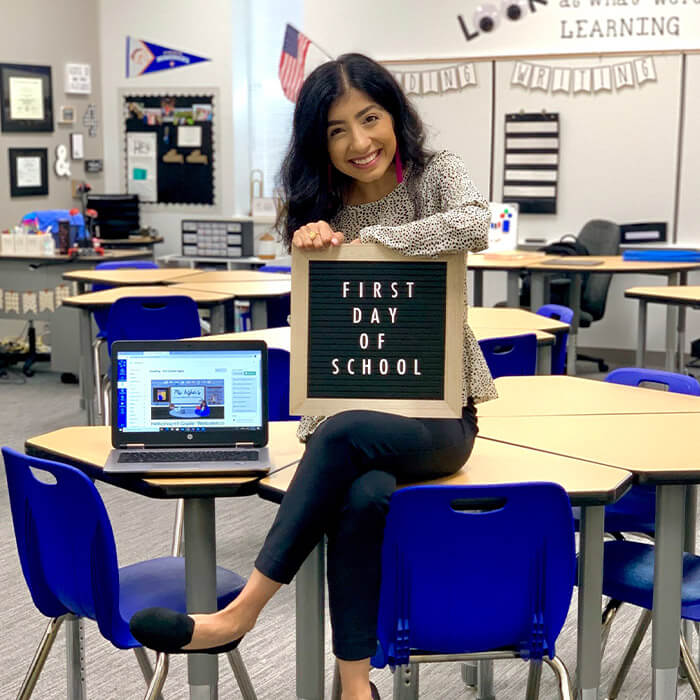
Noor Agha
Continued Support and Maverick Pride
At Corey Academy of Fine Arts and Dual Language in the Arlington ISD, fourth grade teacher Krystal Chavez (’20 BA, Education) says starting her teaching career during a global pandemic has been something she could have never envisioned.
“It has been far from a normal school year and basically the opposite of how I expected to begin my teaching career,” says Chavez. “I have truly learned so much and have grown as an educator. In the classroom we are teachers, counselors, and social and emotional support. It’s essential to provide our students with a safe and comfortable environment in our classrooms.”
No one could have known before March 2020 that UTA’s education graduates would begin their first year of teaching having to manage online and face-to-face learners concurrently. First-year and experienced teachers alike have found this to be challenging.
“Our most recent teacher education graduates have had to adjust very quickly to the new realities of a pandemic-era classroom,” says Teresa Taber Doughty, dean of the College of Education and professor of special education. “I am so amazed by our graduates who continue to impress me with their resilience, wit, wisdom, caring, and creative solutions to teaching during COVID-19.”
UTA’s Office of Alumni Relations and the College of Education have reached out to alumni throughout this difficult year in a commitment to keeping them connected to the vibrant Maverick community and to let them know we’re here for them. This includes gift packages with words of encouragement from past professors and materials they can hang in their classrooms, such as pennants or posters, and other items such as hand sanitizers, masks, and school supplies.
“UTA has continued to show support to me as an alumna,” says Chavez. “I have received their support through emails from my former professors and social media posts from the College of Education, as well as goodies in the mail just to brighten my day. Whatever the future may hold, I know I’ll continue to learn and grow as an educator in part because of UT Arlington.”
“I had such a good experience and learned a lot from my UTA professors, all who have so much knowledge to share. I always recommend my kids to go to UTA if they are thinking about going to college.”
UTA faculty interact frequently with graduates through Twitter and Facebook. This past year as in other years, former students text or send emails to their former professors, sharing teaching experiences or seeking advice.
“Fortunately, our Maverick graduates had the benefit of support from dedicated
UT Arlington faculty and working with incredible local teachers who modeled flexibility along with exceptional teaching practices,” says Dr. Doughty. “They all make me proud every day.”
Noor Agha (’20 BA, Education), teaching fourth grade at Jones Academy of Fine Arts and Dual Language in the Arlington ISD, hopes that things will return to “normal” soon and says she knows she can always reach out to UTA for any guidance or support she needs.
“They’re also navigating this strange world. We all have a lot on our plates,” says Agha. “Overall this has not been an easy year for anybody, but we teach because we love it. We all have a lot of goals and hopes as we continue to teach.”
While teachers hold on to the inspirations that led them to the field of education in the first place, Maverick pride is a bond that sustains them—from UTA faculty who work hard to serve their students to the graduates who leave the University to serve the next generations of scholars.

“I’m constantly promoting UT Arlington to my kids,” says Agha. “I had such a good experience and learned a lot from my UTA professors, all who have so much knowledge to share. I always recommend my kids to go to UTA if they are thinking about going to college. I’m always telling them: You have to go to UTA and be a Maverick.” uta
